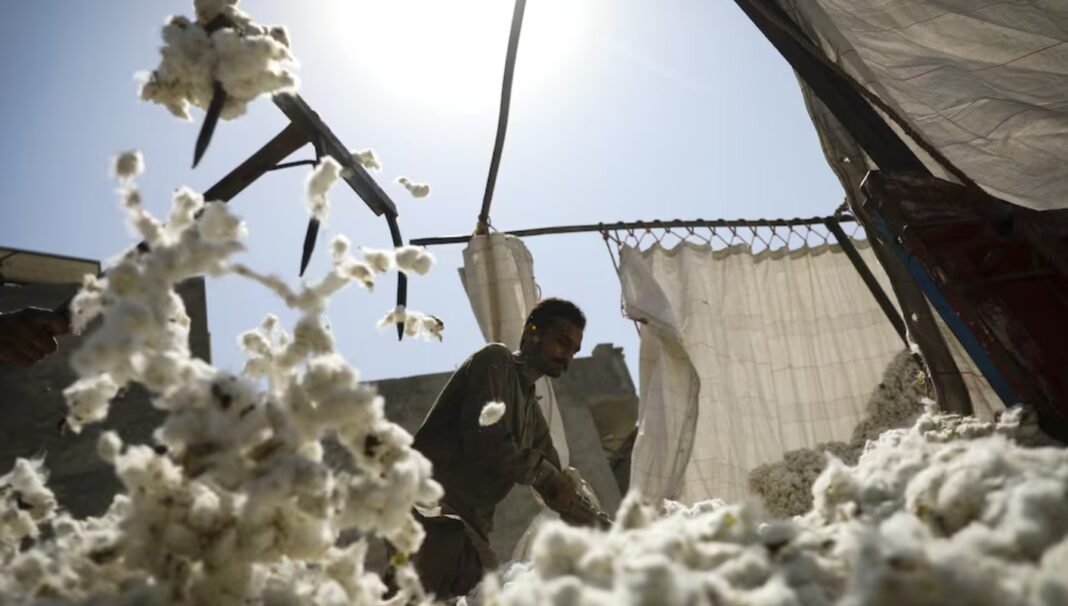Inditex, the Spanish retail giant behind Zara, is making waves in the fashion industry by exiting the world’s largest sustainable cotton initiative amid a growing deforestation scandal. The decision marks a shift towards prioritizing organic fibers in the company’s commitment to more sustainable practices, as the global demand for eco-conscious fashion continues to intensify.
Inditex’s move comes in the wake of increasing scrutiny over the environmental impact of cotton farming. While sustainable cotton schemes, such as the Better Cotton Initiative (BCI), have aimed to address environmental issues like water use, pesticide reliance, and fair labor practices, a deforestation controversy has marred their reputation. Reports recently revealed that some of the cotton sourced through these initiatives was linked to illegal deforestation in countries such as Brazil and India, raising concerns about the true sustainability of such schemes.
Inditex, which has long faced criticism for its fast fashion business model, is now taking a decisive step to shift its focus to more environmentally friendly materials, such as organic cotton. Organic cotton is grown without harmful pesticides and fertilizers, offering a more sustainable alternative to conventional cotton. This aligns with the company’s broader sustainability goals, which include reducing its carbon footprint and increasing its use of renewable materials across its collections.
The Impact of the Deforestation Scandal
The deforestation scandal has proven to be a turning point for many companies within the fashion industry, with several brands reevaluating their supply chains and sustainability practices. For Inditex, the decision to distance itself from the BCI marks a notable pivot away from a widely adopted initiative that many viewed as a step forward in sustainable sourcing. However, the recent revelations about the links between some BCI-certified cotton and illegal deforestation have tarnished the scheme’s credibility, leading major companies like Inditex to reconsider their involvement.
This scandal highlights the complexity of sustainable sourcing within the fashion industry. The pressures to balance consumer demand for cheap, fast fashion with environmental responsibility have made it difficult for many companies to fully embrace truly sustainable practices. While initiatives like the BCI have made strides toward promoting sustainability, they have also faced criticism for failing to fully address the environmental harm caused by their supply chains, especially when it comes to issues like deforestation and land degradation.
A Shift Towards Organic Fibers
Inditex’s commitment to organic fibers represents a strategic shift towards more transparent and eco-friendly alternatives. Organic cotton, grown without synthetic chemicals, is seen as a more reliable and environmentally responsible option compared to conventional cotton or even some sustainable cotton initiatives that have fallen short of their sustainability claims.
The decision also reflects broader industry trends towards organic materials and more holistic approaches to sustainability. With growing consumer awareness about the environmental and social impact of fashion, there is increasing demand for brands to invest in materials that promote both ecological balance and fair labor practices. Organic cotton, alongside other natural fibers like hemp and linen, fits this demand perfectly.
Inditex’s Broader Sustainability Push
Inditex’s departure from the BCI and its focus on organic cotton is part of a larger push within the company to increase its commitment to sustainable fashion. The company has set ambitious targets for reducing its environmental impact, including plans to make 100% of its cotton, linen, and polyester more sustainable by 2025. This includes not only prioritizing organic and recycled fibers but also investing in innovative production techniques that reduce water usage, energy consumption, and waste.
The company has also made strides in transparency, with plans to further disclose its supply chain practices and the environmental impact of its products. As part of its strategy, Inditex aims to increase the use of recycled materials in its garments, reduce its carbon emissions, and promote circular fashion practices.
Inditex has faced increasing pressure from environmental activists, consumers, and regulators to improve its sustainability practices. The fast fashion industry, in particular, has come under fire for its contribution to pollution, waste, and the overconsumption of resources. Inditex’s shift away from the BCI and toward organic fibers is a recognition of the growing need for companies to adapt to changing consumer preferences and stricter environmental regulations.
The Bigger Picture: Can Fast Fashion Be Truly Sustainable?
Inditex’s move is significant not only because of the scandal surrounding the BCI but also because it reflects a broader shift within the fast fashion sector. The challenge for fast fashion brands like Inditex is how to balance the demand for cheap, disposable clothing with the environmental and social responsibility consumers increasingly expect.
While organic fibers and sustainable materials represent a step in the right direction, critics argue that true sustainability in fast fashion cannot be achieved without a fundamental shift in business practices. The speed and volume of production associated with fast fashion create inherent challenges when it comes to sustainability. Producing more sustainable clothing often requires slower, more thoughtful production processes, and consumers may need to adjust their expectations of affordability and availability to accommodate this.
Despite these challenges, Inditex’s recent moves demonstrate the growing importance of sustainability in shaping the future of fashion. As consumers demand more ethical and eco-friendly options, the industry will likely continue to see brands pivot towards greener practices, even as the complexities of achieving full sustainability persist.
In conclusion, Inditex’s departure from the Better Cotton Initiative and its growing focus on organic fibers highlights the changing landscape of the fashion industry. The deforestation scandal surrounding BCI-certified cotton has forced brands like Inditex to reconsider their sourcing practices and embrace more transparent, sustainable alternatives. While challenges remain in the pursuit of true sustainability, Inditex’s push toward organic cotton and its broader sustainability goals signal a shift toward more responsible fashion practices. As the industry grapples with its environmental impact, these moves may be a sign of the evolving future of fashion—one where sustainability takes center stage.






